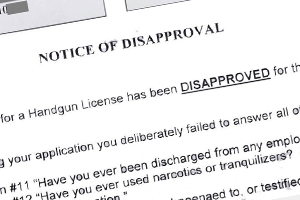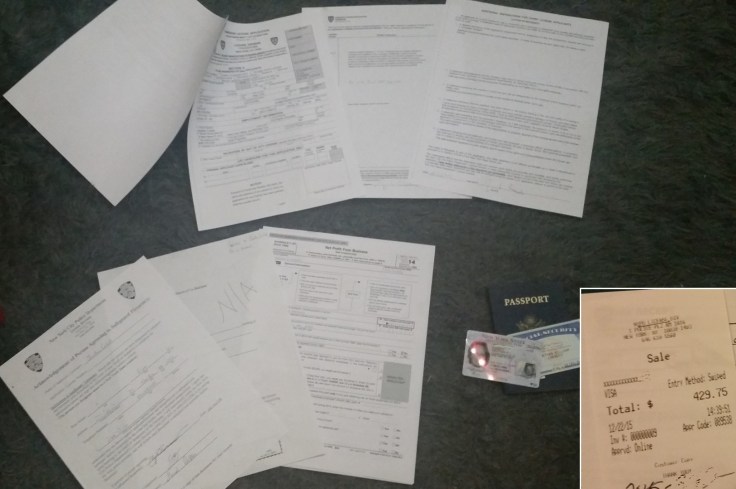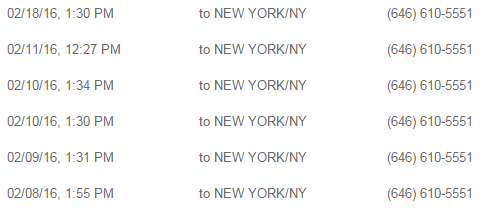This is the fifth installment of a series documenting an ordinary New Yorker attempting to exercise his Second Amendment rights: Part I (license application), Part II (application rejected), Part III (the lawsuit), Part IV (appeal filed).
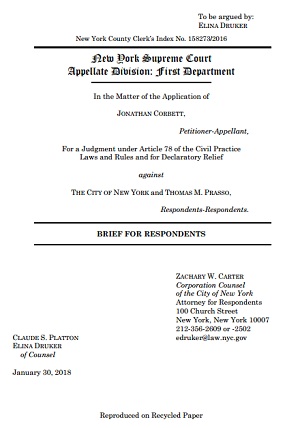 We’re now at 15 months from the date I — just an ordinary citizen with no criminal record — applied for a license to carry a handgun in New York. My application was filed in December 2016, denied in April 2017, and the NYPD denied my administrative appeal in May 2017. My petition to have a lower court review the denial was filed in September 2016 and rubber-stamped by a judge in February 2017 who decided that the NYPD’s denial of the license was “rational” because I didn’t give them a good reason to approve it.
We’re now at 15 months from the date I — just an ordinary citizen with no criminal record — applied for a license to carry a handgun in New York. My application was filed in December 2016, denied in April 2017, and the NYPD denied my administrative appeal in May 2017. My petition to have a lower court review the denial was filed in September 2016 and rubber-stamped by a judge in February 2017 who decided that the NYPD’s denial of the license was “rational” because I didn’t give them a good reason to approve it.
The appellate process in New York is a bit clunky. This is partially owing to the hodgepodge of trial courts — from local town courts that hear small matters, to city courts that hear more significant matters, to county courts that are the highest trial courts. It’s perhaps also partially owing to the odd naming system in place in this state: the original petition was filed in the “Supreme Court,” the appellate court I’m in now is called the “Supreme Court, Appellate Division,” and the next and last court it can go to is the “Court of Appeals.” There’s also the “Supreme Court, Appellate Term,” which is somewhere in between “Supreme Court” and “Supreme Court, Appellate Division,” which was skipped here. Compare this to California, for example, where there are Superior Courts for the trials, Courts of Appeals for the appeals, and their Supreme Court to appeal an appeal — and that’s it. It really shouldn’t take an hour of research just to figure out which court will hear your case.
It’s also clunky because they have very strict, archaic rules about how they want their documents. You can’t electronically file, unlike virtually every other court in the state. But you also must e-mail them a PDF copy, after you “bookmark” each section and subsection in the file (Have you ever used the bookmark feature in Adobe Acrobat? I hadn’t either!). You have to file 8 copies of everything, but you probably can’t just staple the hundreds of pages required per copy. Oh no, you must bind them, but not with comb-binding like you can find at Kinko’s — they only accept binding with metal fasteners or glue binding. If your fasteners are visible from the outside, you have to put tape over them, because we wouldn’t want any sharp edges in the judge’s chambers. Some documents must be double-sided while other documents must be single-sided. You also must use recycled paper for all your printing, because let’s be environmentally-friendly while failing to allow e-filing and requiring 8 copies. And finally, don’t even think about attaching exhibits to your brief (if you want to, say, cite a government document or a news article and provide the court with a copy), because that’s simply not allowed.
That aside, let’s take a walk through what the City says about my appeal (the contents of what they were responding to — my original appellate brief — are discussed in the previous post):
NYPD is tasked with the grave responsibility of protecting New York City’s 8.5 million residents and over 50 million annual visitors from senseless gun violence and accidental shootings.
Well that does sound like a very important task, but how many people are killed each year in New York with legally-owned handguns? They omit that statistic, but I’d bet more people are killed by the NYPD each year than by the 88,000 current license holders in New York.
“But if we increase the number of license holders, then there will be more victims!” Well, the State of Texas has 1.2 million licensees out of 28 million residents (4.3%) and they study how law-abiding those licensees are each year. Not surprisingly, Texas license holders in 2016 committed 0.35% of crimes in total and 0.40% of assaults with a deadly weapon despite being 4.3% of the population.
NYPD rationally denied Corbett’s application for an unrestricted permit to carry a concealed handgun. That determination is due considerable deference and should be affirmed.
In what sane world is a police department due “deference” when evaluating their decision to deny a constitutional right to the citizens? We don’t allow them “deference” when they violate 4th Amendment rights by arresting someone without probable cause — they have to prove that they did, indeed, have probable cause.
NYPD’s requirement that applicants complete a minimally invasive background
questionnaire is part of a presumptively lawful regulatory measure that
does not substantially burden Corbett’s right to bear arms.
The background check asks you to go through your prescription medication history, which I refused to do (no, it’s not limited to “prescriptions that get prescribed to crazy people”). They ask you to tell them any time you’ve ever lost a job. They ask you for everywhere you’ve lived so that they can talk to your neighbors. That’s not “minimally invasive” to me — that’s more like the background check one goes through for a government security clearance (unless you’re Jared Kushner, in which case you can flat-out lie and keep your job). And for those of you who don’t think it’s a big deal, the NYPD admits they would have denied my application even if I had bent over for the background check because I still don’t have a “good reason” for which I “need” a gun.
Corbett was disqualified from carrying a concealed handgun because he obstructed NYPD’s mandatory background investigation [by refusing to answer the most invasive questions]. … His belief that these questions were constitutionally impermissible reflects an absolutist view of the Second Amendment that is not grounded in the law.
In the NYPD’s view, challenging them on the constitutionality of their questions is “obstruction” and “an absolutist view of the Second Amendment.” Sorry, NYPD, the citizens do have a right to challenge you in the courts, nor is my view that there should be a procedure for an ordinary citizen to carry a gun “absolutist.” Keep in mind that I completed an application that contained several dozen pages, came in for an in-person interview, submitted to fingerprinting, and paid over $400 (original app process described here). “The Second Amendment is my gun license” is absolutist. Challenging their most invasive 3 questions and their “good reason” requirement is simply asking for reasonable access to my rights.
But the government’s opposition to my appeal was strangely silent on one issue: the continuing corruption within the NYPD Licensing Division which resulted in several arrests of police officers in 2016 and 2017 and the transfer of the commanding officer who denied my application to another unit. Apparently, the fact that one can buy a “good reason” from the NYPD was not an important enough issue to address.
Here’s hoping that the Court doesn’t ignore the elephant in the room like the City did in their opposition. From here, the Court may order oral arguments, or it may not. Either way, it will then rule on the appeal (sometime this year), which will either result in the case being sent back to the lower court to do something differently, or will result in the appeal being dismissed and my next appeal to New York’s highest court.
Corbett v. City of New York – Appellate Brief (.pdf – 7MB)
Corbett v. City of New York – Opposition Brief (.pdf)
Corbett v. City of New York – Reply Brief (Bookmarked) (.pdf)
 The U.S. Supreme Court has made pretty clear that a “total ban” on any particular gun right is unconstitutional. They seem to be pretty clear that it doesn’t matter whether the total ban is only on the carrying of weapons, or on all ownership, or even on certain classes of weapons. No total bans.
The U.S. Supreme Court has made pretty clear that a “total ban” on any particular gun right is unconstitutional. They seem to be pretty clear that it doesn’t matter whether the total ban is only on the carrying of weapons, or on all ownership, or even on certain classes of weapons. No total bans.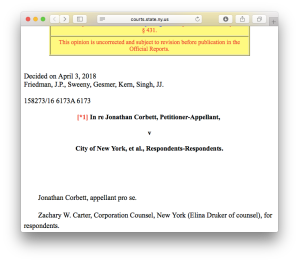 Yesterday the Appellate Division of the N.Y. Supreme Court
Yesterday the Appellate Division of the N.Y. Supreme Court 
 We’re now at 15 months from the date I — just an ordinary citizen with no criminal record — applied for a license to carry a handgun in New York. My
We’re now at 15 months from the date I — just an ordinary citizen with no criminal record — applied for a license to carry a handgun in New York. My  We left off last fall with in
We left off last fall with in  As you probably heard, a man today pulled out a gun in the non-secure area, near baggage claim, of Ft. Lauderdale/Hollywood Int’l Airport (FLL) and
As you probably heard, a man today pulled out a gun in the non-secure area, near baggage claim, of Ft. Lauderdale/Hollywood Int’l Airport (FLL) and 

